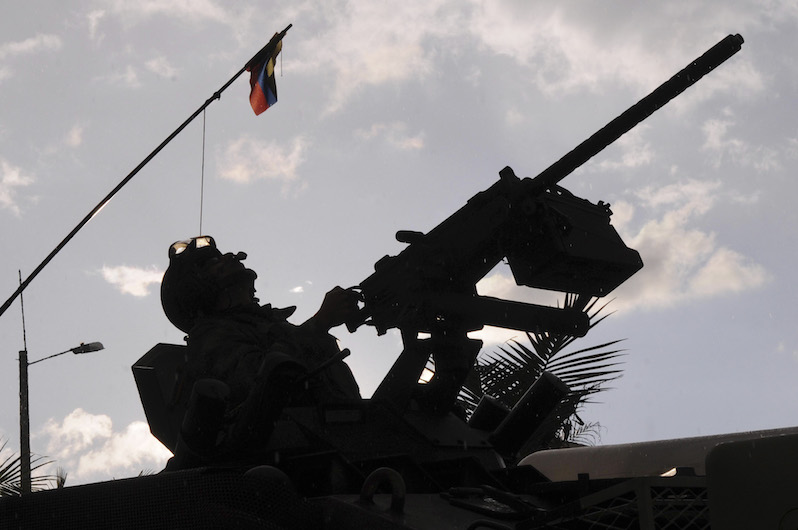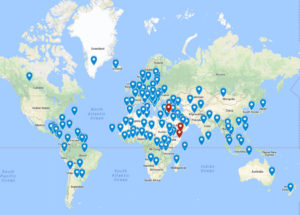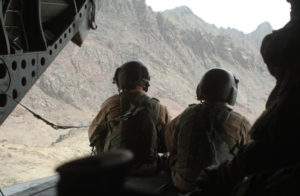The Ghosts Within: A Journalist’s Struggle With PTSD
After 13 years covering the U.S. war on drugs in Colombia, an investigative reporter begins a new journey with his family—learning how to live with an invisible illness. A Colombian soldier near a spot where 10 farmworkers were killed in 2012, reportedly by a drug-trafficking paramilitary group. (Luis Benavides / AP)
1
2
3
A Colombian soldier near a spot where 10 farmworkers were killed in 2012, reportedly by a drug-trafficking paramilitary group. (Luis Benavides / AP)
1
2
3
Most of my students were Colombian human rights defenders and nongovernmental organization workers, and the previous two times I had taught the course, several had asked me to visit their communities to investigate various issues. While I still viewed myself as an investigative journalist, I always politely declined their requests because I simply did not have the time due to my commitments to home-schooling and teaching at Cape Breton University. But the student’s request for me to investigate indigenous child prostitution elicited a very different response. As usual, I said that I doubted I would be able to travel to the region because of time constraints. But inside, I experienced a new and disturbing reaction.
While talking with her, I suddenly realized that I didn’t want to investigate this human rights crisis. The thought of returning to a conflict zone filled me with anxiety. For the first time, I wasn’t declining an invitation to investigate a story because of time and logistical constraints, but because I couldn’t handle the stress of working in a war zone again. This feeling shocked me.
My work in Colombia’s remote conflict zones meant that I often stayed in primitive lodgings and ate whatever food was available. But while teaching the course in Cali, I stayed in a luxurious, four-star hotel and ate in gourmet restaurants, courtesy of the private university that had hired me. I could not reconcile the luxurious working and living conditions I was enjoying with the feeling that I should be in the countryside, investigating indigenous children dying from malnutrition or being forced into prostitution. But I didn’t want to deal with the stress of working in conflict zones again. I didn’t feel like I could cope with it. I actually wanted to be in that luxury hotel. This led me to feel consumed with guilt and anger—both at myself and at a world I perceived to be full of injustice.
Two days later, I had the emotional breakdown in the bar. It seems that the realization that I no longer wanted to be a war correspondent meant that I didn’t have to subconsciously keep all of my trauma-related emotions buried deep inside me in order to be able to function in conflict zones in the future. And so the floodgates opened, and those emotions finally came pouring out—and I cried and cried and cried.
Since my breakdown, my PTSD has not only manifested itself in crying. I feel intense anxiety from the moment I wake in the morning, and often during the night, too, when bad dreams and frequent bouts of insomnia disrupt my sleep. The thought of completing the simplest tasks often seems overwhelming. I don’t feel I can cope with anything and often don’t want to leave the house. Just driving to the store intensifies the anxiety, as does taking the kids to their after-school program or to an extracurricular activity.
Socializing is out of the question. Part of the problem is that PTSD is an invisible illness. From the outside, I appear to be my old self, and people engage with me as if that were the case. But on the inside, I feel broken, and the thought of having to interact with people in my “normal” way is overwhelming. Neither pretending to be “normal” or spilling my guts every time I encounter someone is especially appealing.
Consequently, things I did effortlessly before my breakdown now require enormous mental effort to overcome the anxiety—and that effort is exhausting. Initially, I couldn’t pinpoint a reason for the anxiety. As with the crying, it would just happen, and there was nothing I could do about it. Those episodes, along with my irritability, anger, negativity and depression, made me feel like I was going crazy. And those dysfunctions were compounded by survivor guilt—guilt rooted in privilege and the fact that I was still alive. After all, who was I to feel depressed when millions of Colombians have been killed, maimed, raped and forcibly displaced?
Learning to Live With Trauma
In therapy and through my own research, I learned that PTSD can be caused by a single traumatic event or, as in my case, an accumulation of traumas. I was also surprised to learn that PTSD actually changes the brain. Researchers using MEG scans have shown that the brains of people with PTSD are physically transformed by trauma, unlike those of people who have experienced trauma but do not have the disorder. When most people experience trauma, their brains trigger an emotional response that subsides over a relatively short period of time. Most people eventually return to “normal” and can reflect on the traumatic experience without triggering the original emotional response.
But sometimes trauma results in PTSD, which occurs when a short circuit in the brain doesn’t allow the separation between the traumatic event and the emotional response to develop over time. In other words, the person keeps experiencing the full force of the emotional response to the trauma over and over, often for years, as though the trauma is happening in the present moment. And because victims re-experience the traumatic event long after it has occurred, they often try to avoid reminders of the event and also exhibit hyperarousal and negative changes in their worldview.
For me, the crying and anxiety constitute a re-experiencing of my emotional responses to traumatic events. And because most of our thoughts happen at the subconscious level, I often feel like I’m crying or feeling anxious for no reason. But in actuality, the crying is me responding emotionally to subconscious thoughts about past traumatic events, while the anxiety is rooted in a trauma-induced fear that something bad is about to happen. These emotional responses are also triggered by conscious thoughts and by specific occurrences, such as the sound of a traffic helicopter overhead, which instantly transports me back to my experiences with Colombian army helicopters in that country’s conflict zones. I also have to avoid political discussions and news stories, which can become triggers.
I continue to experience hyperarousal in the form of extreme sensitivity to unexpected noises, which instantly trigger irritability and anger. This occurs because I am still functioning mentally in the same state of hyperalertness required to survive in a conflict zone. Because my brain has failed to recognize that the danger no longer exists, it responds instantly to the perceived potential danger that a sudden noise represents, rather than taking a moment to analyze the situation and determine the appropriate response.
Through therapy I have learned techniques to help me live with the trauma and related survivor guilt. These have included developing mindfulness techniques that help me focus on the present moment, particularly when a trigger is activated. The objective is to separate my emotions from my thoughts. Focusing on the present helps me recognize that a surfacing emotional response is actually related to a thought about a past event that has nothing to do with what is happening at that moment.
This mindfulness practice helps diminish the intensity of my anxiety, irritability and anger, as well as the bad dreams and insomnia. It has helped me recognize that my over-the-top reaction to the Tupperware container was not caused by the inherent evilness of that object (or its lack of a lid), but rather by past traumatic experiences.
In addition to therapy, I have sought out articles, books and documentaries about PTSD and people who live with it. While there is a lot of information about the PTSD experienced by military personnel, there is a shortage of material about journalists who suffer from the disorder. I initially wrote this article to help fill that void but quickly discovered that the writing itself was therapeutic. It has, however, also induced further feelings of guilt. It seems that white male privilege prevails yet again. I have access to therapy and an outlet for telling my story, while many of the Colombians I met in that country’s conflict zones—who likely also suffer from PTSD—continue to be ignored.
Learning to live with PTSD is a huge challenge, and so far, the results are mixed. I still have a largely negative and cynical view of human beings and of the world in which we live, and I haven’t yet been able to escape frequent bouts of depression. There are days when I feel I am doing well and have things under control. But there are many more days when I feel overwhelmed by the multitude of triggers and resulting emotional responses.
Meanwhile, Terry and I talk to Owen and Morgan about my disorder so they can understand what I’m going through and gain insight into my behavior. And for Terry and me, just understanding the cause of the change in my behavior has helped alleviate the stress of not knowing its origins before my breakdown occurred. At least we now know what is happening and why.
As my therapist has repeatedly told me, I am never going to be the same person I was before I became a journalist. That person is gone. In some ways, this is a good thing, because in the years preceding my breakdown I was slowly falling apart. But now I have to learn to live with the trauma, because it will always be part of me.
My biggest question is related to how that trauma manifests itself in the new me. And not yet knowing who the new me will be is very disconcerting. Traits such as being laid-back and outgoing, which had been prominent parts of my personality for decades, are no longer evident. So who will the new me be? Will I continue to be the angry and anxiety-ridden person I am at the moment? Or will I eventually become a more mindful and compassionate person, capable of managing the ghosts within? On my good days, I strive to become the latter.
Garry Leech is an independent journalist and author of eight books, including “How I Became an American Socialist” (Misfit Books, 2016), “Capitalism: A Structural Genocide” (Zed Books, 2012) and “Beyond Bogotá: Diary of a Drug War Journalist in Colombia” (Beacon Press, 2010). He teaches international politics at Cape Breton University in Nova Scotia, Canada, and at Javeriana University in Cali, Colombia. For more information about Leech’s work, visit his website.
Your support matters…
SUPPORT TRUTHDIG
Independent journalism is under threat and overshadowed by heavily funded mainstream media.
You can help level the playing field. Become a member.
Your tax-deductible contribution keeps us digging beneath the headlines to give you thought-provoking, investigative reporting and analysis that unearths what's really happening- without compromise.
Give today to support our courageous, independent journalists.






You need to be a supporter to comment.
There are currently no responses to this article.
Be the first to respond.